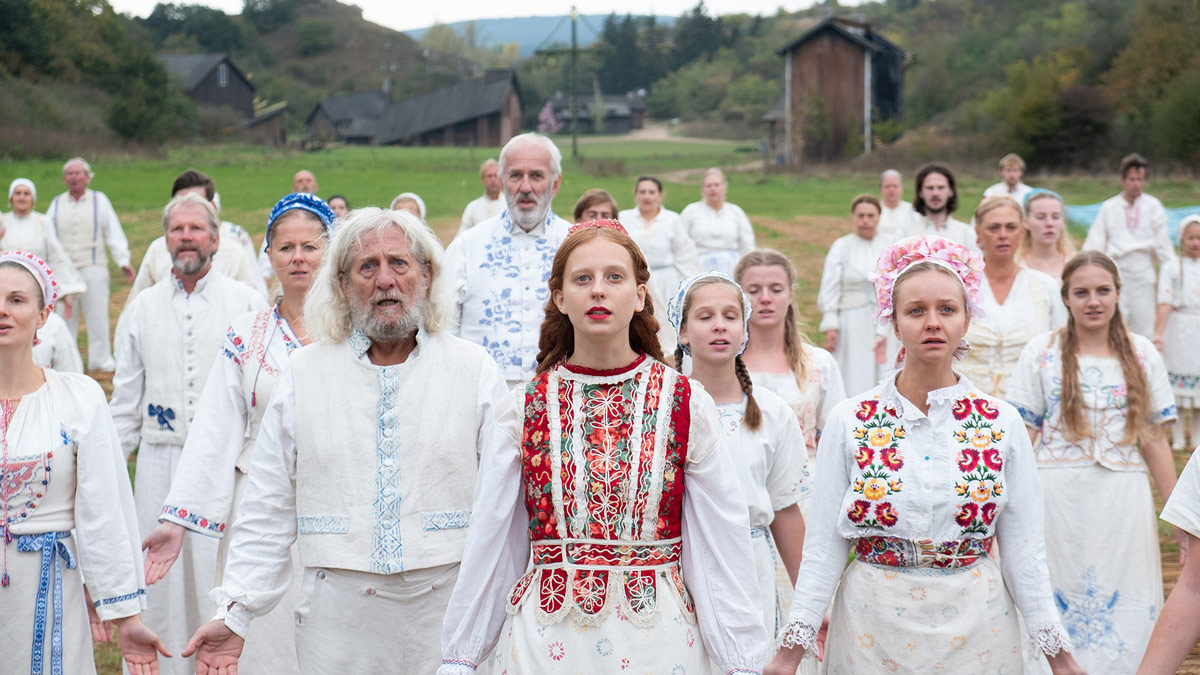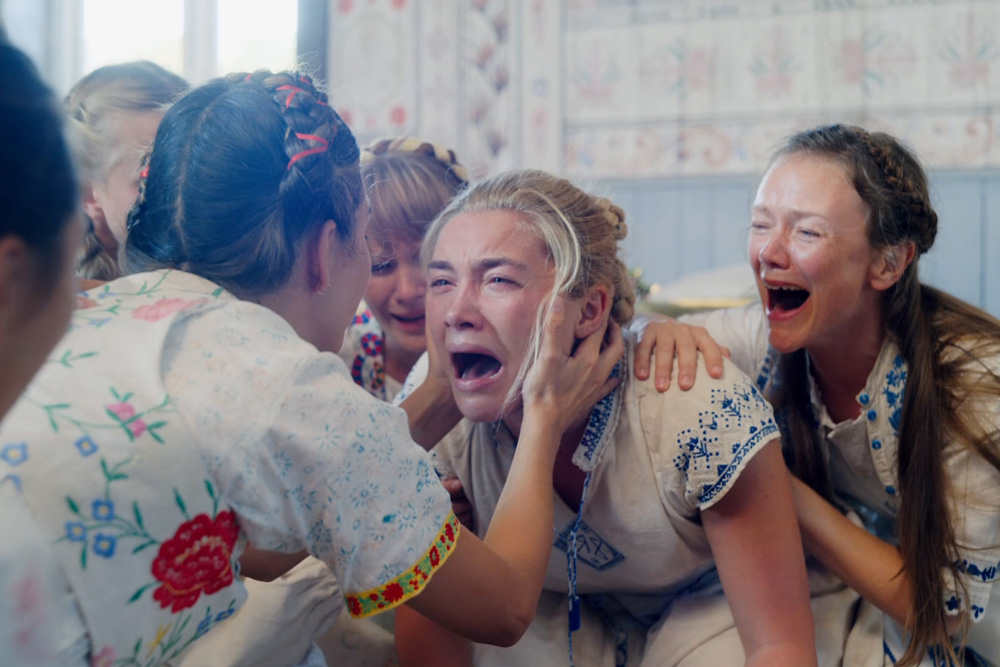
(c)2019 A24 FILMS LLC. All Rights Reserved.
"Midsommar" Demonic induction from fear to "empathy" - A love story that erases the ego
2020.02.22
The impression of the work changes depending on the perspective of men and women
A depiction of villagers changing in a way that corresponds to a romantic drama. The first thing I want to focus on here is Danny's "crying" scene. Scenes in which Danny cries frequently appear in this film, but they are not drawn blindly at all. One is the role of routine to establish the accumulation of emotions, and the other is the acceleration of pity and the switch for relief.
In the movie, Danny is ashamed of crying. This is because while she understands that her own mental state is unstable, she also has a fear of being dumped because she is a ``heavy woman.'' Therefore, during crying scenes, she usually goes into a private room or leaves the circle to be alone. However, the villagers of Holga, who live with the idea that everyone is a family and should share their feelings, do not allow themselves to be alone. She tries to stay close to Danny and share their passion together.
Have you ever watched American movies and noticed that "group therapy" appears frequently? It's the same with " Avengers: Endgame " (2019), and it's the same with " Rocketman " (2019). In `` Sugar Rush '' (2012), a scene in which The Game characters participate in group therapy is depicted as a running gag. This is probably a very familiar form of ``relief'' for the American people. What the villagers of Holga do is similar to this...it seems like it's a bit more cult-like.

“Midsommar” (c)2019 A24 FILMS LLC. All Rights Reserved.
Instead of ``respecting and affirming individual feelings'' like in group therapy, what they have is a philosophy of ``disappearing the individual and becoming one.'' This could lead to a group similar to the Manson Family portrayed in Once Upon a Time in Hollywood (19). However, the big difference is that there is no leader. Because they are built to live according to ``tradition'' rather than being agitated by charisma, they are also easy to be co-opted. However, once you go inside, you are completely freed from ``solitude'', so it cannot be said that it is a bad thing. Because that's normal in that place.
I mentioned earlier that the ``understandable'' part is the depth of Midsommar, and the reason why Danny is almost absorbed by the villagers of Holga is because there are benefits to it. What's more, it's interesting because the "presentation" is made step by step.
First, Danny has lost his family, is treated like a tumor by his lover, and simply has no place to belong. However, the villagers of Holga need her. They invite you to ``participate in the festival,'' treat you kindly, and ``let's cook together.'' Furthermore, they present a new idea about the concept of death, and light up a ray of hope within Danny, who has been forced into his sister's mind. And they try their best to share their pain. It's extremely comfortable.
Of course, throughout the film, horrifying events occur frequently in Holga, and the university students experience gruesome horrors. However, is there any more despair for Danny, who has experienced the death of his entire family in the outside world and is now being held captive by his lover, who was his last resort? She was already at the bottom when she came to Holga, so her position was different from the other members. When someone who understands appears to Danny, who is immersed in deep loneliness, what will be there will be nothing but relief.
In other words, ``Midsommar'' is a pure horror/thriller when viewed from Christian's perspective, but when viewed from Danny's perspective, it is a human drama and love story of redemption. This phase shift symbolizes the difficulty of love, and at the same time, as the audience's ``sympathy'' shifts from Christian to Danny, their image of the work changes as well. There are many aspects of this film that make it stand out, but the fact that it even takes into account the catharsis you will experience after watching it is truly frightening.
As a side note, there is a rumor going around in Sweden that people will break up after watching ' Midsommar.' Watching movies is a test of a couple's love. This movement can be said to be proof that this film firmly depicts the essence of love (director Ali himself used his own experience of heartbreak as the motif for this film).
A "synchronized" movie that evokes in the viewer the anxiety and pain of love. An excellent device that brings unexpected "relief" to the viewer. There is a strange feeling of exhilaration that comes over the viewer's mind as they leave the theater. Once again, this work is, after all, a pure love story.
However, the very fact that we write that, in other words, the moment we feel ``saved,'' we are being carried away by the people of Holga. He is already being ``manipulated'' by Director Ali.
Maybe there was no personal intention in this sentence from the beginning...
Text: SYO
Born in 1987. After The Graduate from Tokyo Gakugei University, he worked at a film magazine editorial production site and a film information site before becoming a film writer/editor. Works on a wide range of topics including interviews, reviews, columns, event appearances, and recommendation comments. Contributed to ``CINEMORE'', ``FRIDAY Digital'', ``Fan's Voice'', ``Eiga.com'', ``Cinema Cafe'', ``BRUTUS'', ``DVD & Video Distribution'', etc. Twitter「 syocinema 」
Reserve “Midsommar” now ↓
"Midsommar"
From Friday, February 21, 2020, TOHO Cinemas Hibiya and other nationwide roadshows
Provided by: Phantom Film/TC Entertainment
Distribution: Phantom Film
(c)2019 A24 FILMS LLC. All Rights Reserved.

